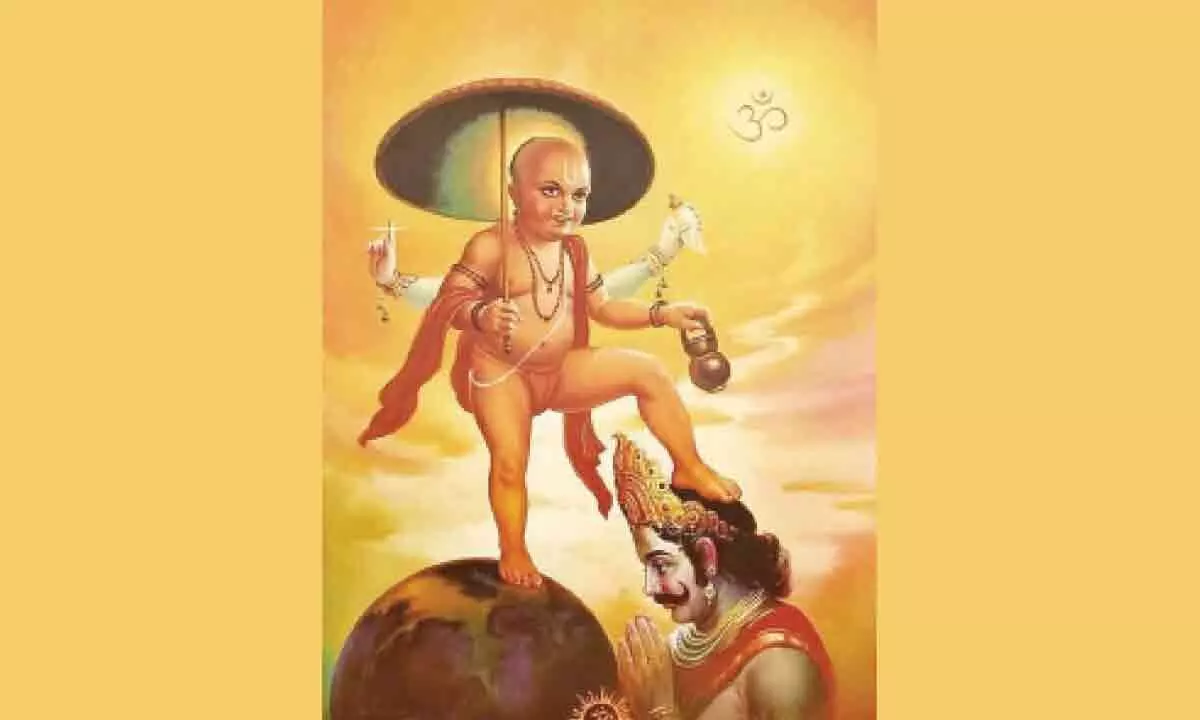Deepavali

We now have Deepavali, one of our grandest festivals. The stories associated with it will run into a small book. There are stories associated with Vishnu restraining Bali, Krishna killing Naraka and some other stories. But the most misunderstood story is that of Bali, a demon king who was restrained by Vishnu. Fortunes fluctuate between gods and demons, and when the fortunes of gods are snatched by demons, Vishnu intervenes usually. In this case too, Vishnu takes avatar as a young Brahmin named Vamana
Ours is a celebratory culture. Our religious calendar is full of stories woven around gods of various traditions. In the vast land of Bharata varsha, different traditions, such as Vishnu, Shiva, Ganesha, Shakti and many others flourished in different regions. But when the unifying philosophy of the Upanishads spread all over the land, our sages harmonized all these traditions. Philosophy is the common thread which united them all.
In every tradition we find a story of a god vanquishing a demon. The Sanskrit word for God is Deva, which etymologically means ‘shining’. Shine and light are words which represent intelligence, righteousness, and all positive qualities. The Sanskrit word for a demon is asura, which etymologically means ‘one who indulges in sensual pleasures’. In fact, at the philosophical level, even heaven, the world of pleasures, ruled by Indra, is called demonical in nature, because there are mere pleasures and no enlightenment in it.
We now have Deepavali, one of our grandest festivals. The stories associated with it will run into a small book. There are stories associated with Vishnu restraining Bali, Krishna killing Naraka and some other stories. But the most misunderstood story is that of Bali, a demon king who was restrained by Vishnu. Fortunes fluctuate between gods and demons, and when the fortunes of gods are snatched by demons, Vishnu intervenes usually. In this case too, Vishnu takes avatar as a young brahmin named Vamana.
This is a famous story in Srimad Bhagavatam, told in nine chapters. Bali, as the name indicates, is one who is proud of his balam, strength. He conquers earth and then defeats Indra and takes heaven. He assumes the powers of all other gods. But he is truthful, charitable, and has a vow to give away anything asked by sages during the performance of a yajna. At a spiritual level, his greatest fault is pride. Snatching heaven implies indulgence in sensual pleasures.
We know the story of how Vamana approaches Bali when he is performing a yajna. Bali receives him with reverence and offers to give whatever he wants. Vamana asks for just three feet of land which he would measure with his own feet. Apparently, it was meaningless, but the guru of demons sees through the game and warns Bali not to promise. But Bali is a man of his word. He donates the land and then the young lad Vamana grows beyond the orb of sun. With one foot he covers the whole earth, and his body fills the universe on all sides. With another foot he measures all heavenly worlds, and there is no place to measure the third foot. Bali sees the cosmic form (which is shown in the Gita) and realises that the whole universe is a mere manifestation of the lord, whereas the little ego thinks that it is the lord of huge empires and lands. His ego, the great obstacle for liberation, dissolves in the infinity of Vamana. Earlier, he had violated the norms of creation and had taken heaven away from Indra, thus snatching what did not belong to him. Bali asks Vamana to place his foot on his head, signifying the little ego merging in the infinite. Vamana tells Bali to give heaven back to Indra and asks him to go and rule the nether worlds (mythological visualisation). Prahlada, the grandfather of Bali comes there and praises Vishnu for teaching a lesson to his grandson. In the course of time Bali would attain liberation. Vishnu is pleased by the truthful nature of Bali and promises that he will be the guard of Bali’s fort in the nether world. Another text, Vishnu purana, dramatises this and describes Vishnu placing his foot on the head of Bali and pushing him underground. A head represents ego, which is symbolically crushed. This symbolism is misinterpreted in racial terms by some modern ideologues, but it is not the meaning of the story. One can see the grandeur of discussion if one reads the whole text (even in translation). Bali is celebrated on the day after Deepavali.
Let children enjoy the celebratory part but let us read this whole story from Srimad Bhagavatam during this period. This, in fact, is the design of our sages to help seekers in their path.
(The writer is a former DGP, Andhra Pradesh)








